Relocating to a new city? Sold your car to a buyer on the opposite coast? Whether it's East Coast to West Coast or anywhere in between, getting your vehicle safely to its new home is a significant concern. This is where the dilemma often occurs - to tow or to ship? As an American vehicle owner, this decision can be as perplexing as choosing the right BBQ sauce for your Fourth of July cookout.
No worries, we're here to help. This handy guide will walk you through the ins and outs of long-distance car towing and cross-country car shipping. By the end, you'll have a good grasp of both methods and be better equipped to choose the right one for your circumstances. And remember, no matter which method you select, True Carrier is your trusted partner to get your prized possession where it needs to go.
Summary
Understanding Long-Distance Car Towing
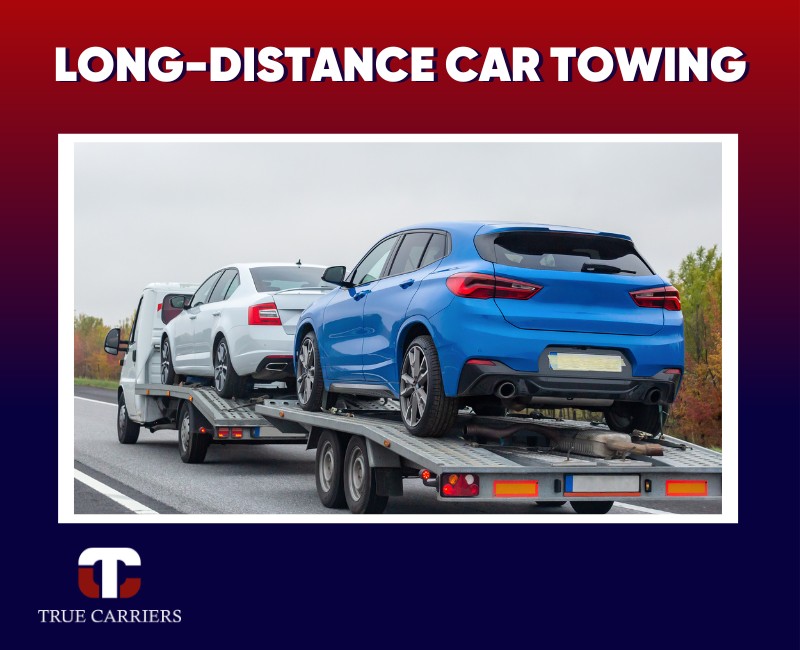
When we talk about long-distance car towing, we’re referring to the practice of pulling a vehicle behind another using a chain, bar, or a three or four-wheel trailer. This method can be useful for situations like moving a broken-down car to a nearby repair shop or towing a small vehicle behind an RV on a road trip. However, when it comes to long distances — crossing state lines, for instance — the game changes considerably.
There are multiple factors that make long-distance towing a more complex process. It’s not as simple as hitching your vehicle to a truck and hitting the road. Firstly, different states have varying regulations on towing, including speed limits, maximum towing capacity, and requirements for trailer brakes. These regulations ensure safety on the roads, but they also mean that you need to be well-prepared and informed before you embark on a long-distance towing journey.
Another critical factor to consider is the wear and tear on the towed vehicle. The towed car’s wheels are in constant contact with the road, which can lead to significant wear over long distances, particularly on the tires and the vehicle’s frame. It’s also important to remember that the towed vehicle needs to be steered, meaning a second driver might be necessary if the towed vehicle is not on a four-wheel trailer.
Moreover, the added weight of the towed vehicle increases fuel consumption and places extra strain on the towing vehicle’s engine and transmission, which can lead to additional maintenance costs.
Finally, let’s talk about safety. Towing a car over long distances requires experience and skill. Issues like trailer sway, difficulty braking, and added length can make driving challenging, especially in adverse weather conditions or heavy traffic.
In short, while long-distance car towing might seem like an economical solution on the surface, it’s essential to consider all the implications before hooking up your vehicle to a tow hitch.
Understanding Cross Country Car Shipping
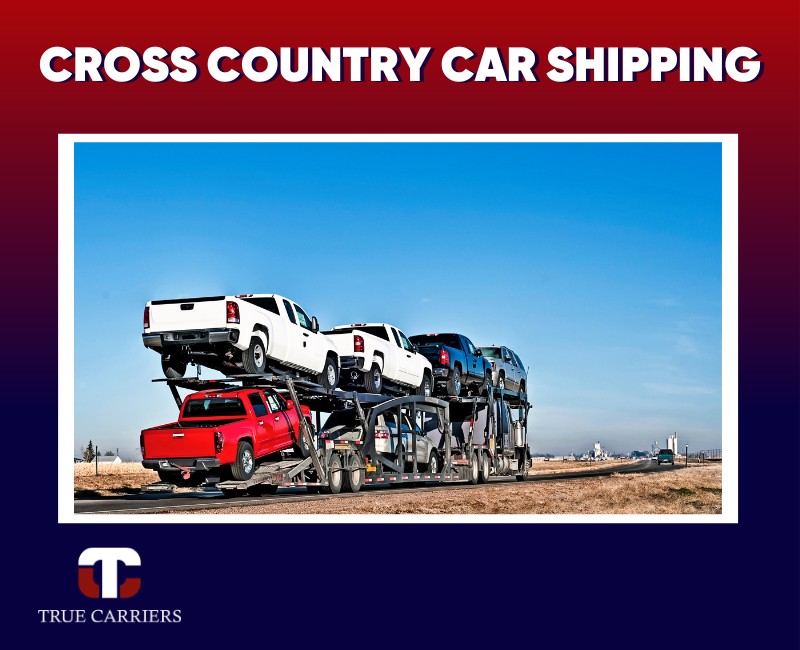
Cross country car shipping is the process of transporting a vehicle from one location to another using specialized vehicles designed for carrying cars. Instead of driving or towing the car, it’s loaded onto a truck and delivered to its destination. It’s a method that has gained popularity for its convenience and the protection it offers vehicles, especially over long distances.
One of the most common types of car shipping is open transport, where the cars are loaded onto a multi-car trailer. It’s the most economical choice and is perfectly safe for most vehicles. However, for those with a classic, vintage, or high-value car, there’s the option of enclosed transport, which provides extra protection against the elements and road debris.
When it comes to cross country car shipping, the logistics are handled by professionals who have the skills and equipment to ensure your vehicle is safely delivered. The process typically includes door-to-door service, where your vehicle is picked up from a location of your choice and delivered to the destination you specify. It’s a hassle-free process that eliminates many of the stresses and challenges associated with long-distance towing or driving.
Perhaps the biggest advantage of cross country car shipping is the reduced risk of wear and tear on your vehicle. Because your car isn’t being driven or towed, but rather loaded onto a transport vehicle, it arrives at its new home with the same mileage and condition as when it was picked up.
Another benefit is the ability to transport multiple vehicles at once. This is particularly useful for families or businesses moving across the country with more than one vehicle.
Safety is another key advantage of cross country car shipping. Professional auto transport companies like True Carrier adhere to strict safety regulations imposed by the Federal Motor Carrier Safety Administration (FMCSA), ensuring that your vehicle is in safe hands throughout the journey.
Cross country car shipping is a convenient, safe, and efficient way to transport your vehicle across long distances, saving you time, effort, and potentially unnecessary wear on your vehicle.
Comparing Long-Distance Car Towing
vs Cross Country Car Shipping
When it comes to relocating a vehicle over long distances, both long-distance car towing and cross country car shipping have their unique advantages and potential downsides. Here’s a side-by-side comparison of both to help you make a more informed decision.
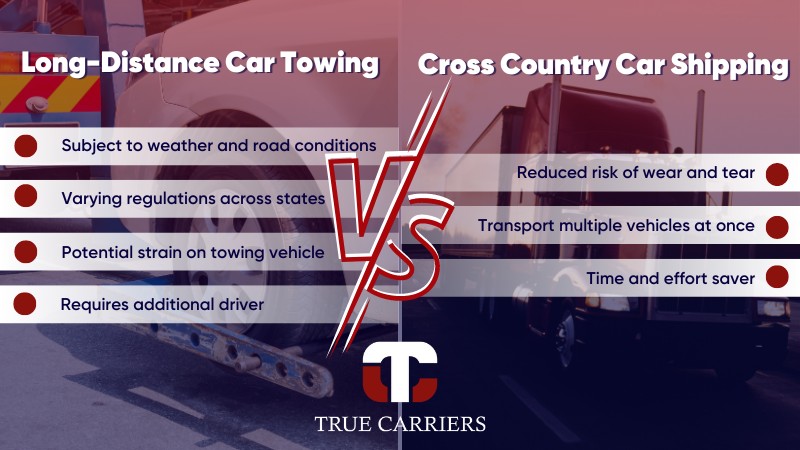
Safety and Wear & Tear
Long-distance car towing could mean subjecting your car to the natural elements, road conditions, and potential accidents. The constant contact with the road could lead to significant wear and tear on the tires and the vehicle’s structure. In contrast, cross country car shipping shields your vehicle from these risks, reducing wear and tear and ensuring your vehicle arrives in the same condition it left.
Convenience
When towing a vehicle, you need to consider multiple factors such as tow equipment, the capacity of the towing vehicle, and the varying regulations across different states. You might also need to factor in the additional driver requirements, the strain on the towing vehicle, and the risk of potential breakdowns. On the other hand, car shipping services like those provided by True Carrier offer a hassle-free door-to-door service. All logistics, including loading, unloading, and safe transportation, are handled by professionals, leaving you free to focus on other aspects of your relocation or sale.
Time and Effort
Towing a car over a long distance demands time, effort, and undivided attention. It requires you to plan the route, adhere to speed limits, and potentially deal with unforeseen problems along the way. With cross country car shipping, once your vehicle is loaded onto the transport truck, your work is done. The car shipping company handles the rest, saving you valuable time and effort.
Multiple Vehicle Transport
If you need to transport more than one vehicle, car shipping stands out as the more convenient and cost-effective method. Professional auto transport companies can load multiple vehicles onto a single transport truck, making it an efficient solution for families or businesses moving multiple vehicles across the country.
In essence, while long-distance car towing may seem more economical on the surface, it has its challenges and potential costs. On the other hand, cross-country car shipping, although seemingly more expensive, provides added safety, convenience, and peace of mind that might make it a more favorable option, especially when you engage a reliable and experienced car shipping service like True Carrier.
Comparing Prices of Long-Distance Car Towing and Cross-Country Car Shipping
You’ve got your eyes on the horizon – but before that cross-country trek, let’s talk dollars and cents. In the great debate of long-distance car towing vs. cross-country car shipping, costs can tip the scale. Here’s a down-home, coast-to-coast comparison.
Long-Distance Car Towing
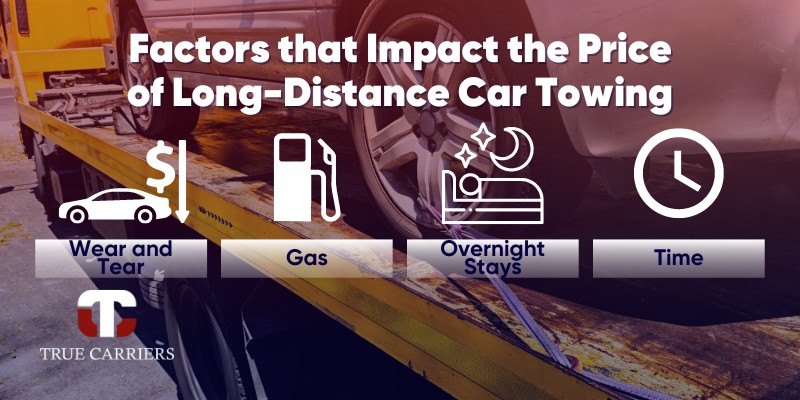
At first glance, towing your vehicle across state lines can seem easier on the wallet, especially if you’ve got towing gear good to go. But remember, friend, there’s more to it than meets the eye. Costs can creep up like ivy on an old oak tree:
Cross-Country Car Shipping
Car shipping might seem like a pricier option, but look beyond the dollar sign. There’s value hidden in those hills:
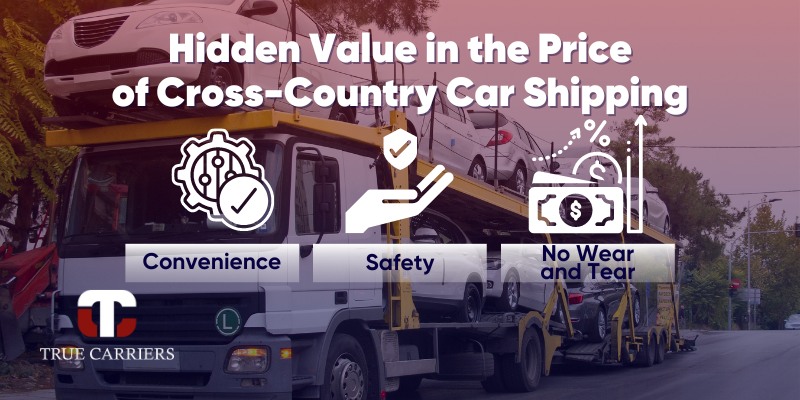
The price of shipping your car can swing based on distance, the size of your vehicle, the route, and your choice between open or enclosed transport. As a ballpark figure, shipping from NY (New York) to CA (California) could set you back anywhere from $600 to $1,000. But for a more precise quote, check out our car shipping cost calculator for a free online estimate.
Let’s break it down further with a small chart of average costs for cross-country car shipping (for the average sedan):
Origin (City, State) | Destination (City, State) | Average Cost | Cost per Mile |
New York, NY | Los Angeles, CA | $1,000 | $0.40 |
Miami, FL | Seattle, WA | $1,100 | $0.44 |
Houston, TX | Chicago, IL | $800 | $0.50 |
So, when it comes to long-distance car towing and cross-country car shipping, look beyond the upfront costs. Safety, convenience, and preserving your vehicle’s condition might just make that initial price tag worth it. When in doubt, remember: True Carrier’s here to make the journey smoother.
Choosing between long-distance car towing and cross-country car shipping can feel like navigating a winding road. While towing might seem less expensive at first glance, the potential wear and tear, time commitment, and hidden costs can add up quickly. On the other hand, car shipping, while potentially more upfront, offers unmatched convenience, safety, and the comfort of knowing your vehicle will arrive in the same condition it left.
Whether you choose to tow or ship, remember that professional help can make all the difference. True Carrier, with its wide range of vehicle transport services, commitment to safety, and a team of skilled professionals, can transform a complicated process into a smooth journey. So, buckle up, sit back, and let True Carrier take the wheel for your vehicle transport needs. It’s not just about getting from Point A to Point B; it’s about enjoying the ride. Safe travels!
FAQs
Does the type of car I have influence whether I should choose car towing or shipping?
Absolutely. Luxury, classic, or high-value cars are often better suited for shipping to minimize wear and tear and potential damage. Regular-use cars might be more economically towed, depending on distance.
Are there any restrictions on what I can leave in my car during shipping?
Yes, personal items are generally not permitted in the vehicle during shipping due to weight restrictions and potential for damage. It’s best to empty your car beforehand.
Is door-to-door delivery available with cross-country car shipping?
Yes, companies like True Carrier offer door-to-door delivery for maximum convenience. They’ll pick up and deliver your car as close to your specified addresses as possible.
What is the difference between open and enclosed transport in car shipping?
Open transport means your car is transported on an open carrier and exposed to the elements. Enclosed transport, although pricier, provides your vehicle with protection from weather and road debris.
What should I do to prepare my car for long-distance towing or shipping?
Clean your vehicle, perform a thorough inspection for pre-existing damage, remove personal items, and make sure your car is in good running condition.
Does the season matter when planning for car shipping or long-distance towing?
Yes, winter can bring harsh conditions that might impact both methods of transport. Some roads are also closed during winter, which may affect the transit time and route. Always check with the company regarding seasonal considerations.




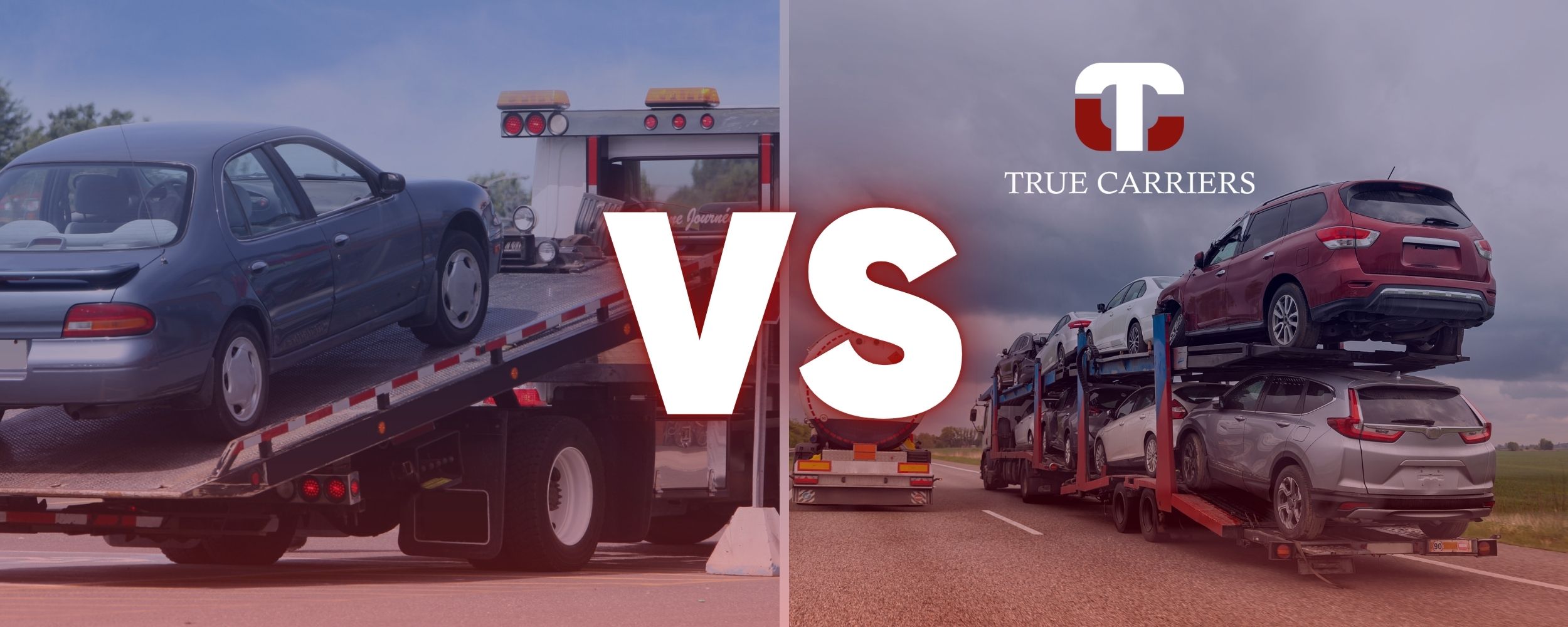








Thank you for sharing such an informative blog. If you are thinking of an affordable car transport service, you can contact us.